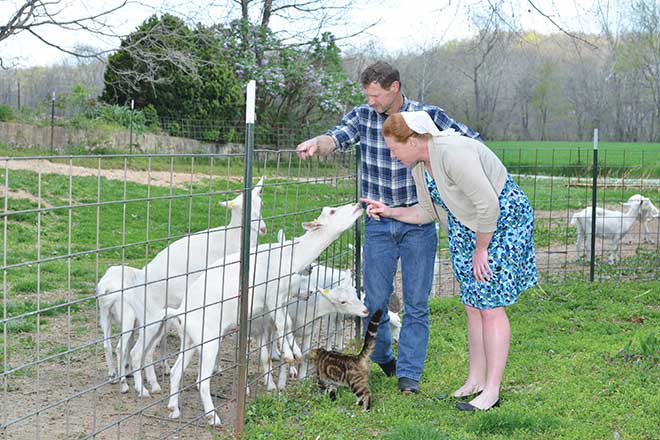It might have been serendipity in 1998 when Veronica Baetje, already considering trying her hand at cheesemaking, found someone selling a goat for $45. But plenty of hard work followed, transforming Baetje’s hobby into a full-fledged creamery that now produces some of the best French-style
goat cheese in the world.
Located in Bloomsdale, Missouri, the farm, which Baetje runs with her husband Steve, operates out of a century-old barn, constructed from a Sears and Roebuck kit. Prior to their move to Bloomsdale, the Baetjes lived in a Mennonite community in southeast Illinois where they grew their own food and tended a large garden. “That was inspiring from both a spiritual and lifestyle standpoint, living closer to the earth and using the resources God gives us to produce food,” she notes. It was this, combined with happy memories of her father making cheese in the St. Louis home where she grew up, that led Baetje to consider cheesemaking herself. “I remember how exciting it was to make milk coagulate and turn into cheese,” she recalls.
Cheesemaking was initially a fun pursuit, allowing Baetje to learn the ropes on a small scale. When she discovered just how good her cheeses were, she was inspired to start a business. The Baetjes took their education seriously, attending the Vermont Institute for Artisan Cheese and advanced cheesemaking courses at the University of Wisconsin-River Falls.
To produce its cheeses, Baetje Farms starts with happy, healthy animals; it now is home to 90 Saanen goats, a white breed from Switzerland. They drink filtered spring water from the farm’s well, and their antibiotic-free, whole-grain diet, which includes oats, molasses and flower seeds, is supplemented with organic herbal teas, Baetje says. “Our animals have open-air housing, so they’re free to come and go outside as they please.”
The production process is entirely hands-on. To transform the goats’ milk into cheese, Baetje Farms uses fresh rennet and cultures imported from Europe. Each cheese is hand-wrapped and goes through a delicate aging system. “The most satisfying thing is when you’re in the aging room and the cheese looks, smells and tastes wonderful,” Baetje says. “It’s such a fulfillment of all your hard work.”
Baetje Farms produces on average around 750 pounds each week. The first cheese it produced was the heart-shaped chevre, and it now also offers a variety of savory and sweet Coeur de la Crèmes and five types of aged cheeses. One of the most popular is the pyramid-shaped Bloomsdale, inspired by the French Valançay cheese. For five years in a row, this has won the top ranking at the World Cheese Awards, beating out more than 2,500 others. Baetje adds that while she is on the award’s judging panel, she doesn’t participate in judging her own cheese. Another award-winner is the Miette, a creamy variety made with sheep and goat milk. “It has a nice yeasty rind, and it makes the aging room smell like rising bread dough and fine white wine,” Baetje says. “The density is similar to a cheesecake that melts on your tongue.”
Baetje Farms ships its cheese all over the country. Locally it can be found at Whole Foods and specialty cheese and wine shops. Some items also are offered at local farmers markets.
 baetje farms marinated feta salad
baetje farms marinated feta salad
serves 1
mixture of organic baby spinach and romaine lettuce
5 greek olives, pitted and sliced
5 organic cherry tomatoes, sliced
2 T. Baetje Farms marinated feta
1 crushed and dried bird’s eye pepper (or 1 T. red pepper flakes)
» Layer ingredients in order. No additional dressing is needed, as the feta’s olive oil marinade is excellent.
baetje farms pasta alfredo
serves 4-6
10-12 oz. bowtie pasta
2 5-oz. packages Baetje Farms coeur de la creme garlic & chive
4 oz. butter
4 oz. grated parmesan
4 oz. milk
» Cook pasta al dente. Drain and set aside.
» In a saucepan, combine remaining ingredients. Cook and stir over low heat until thoroughly mixed and melted.
» Fold sauce into pasta and serve. May garnish with grilled shrimp or chicken.
Photos: Bill Barrett








